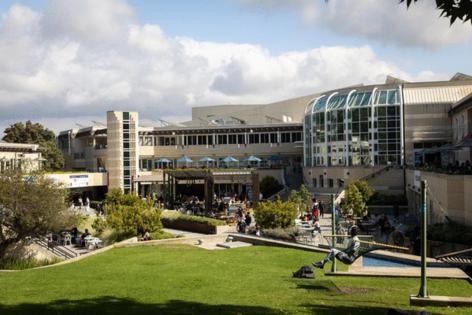San Diego researchers face big losses if court allows Trump funding cuts
Published in Political News
USA Spending, a federal database that compiles most federal expenditures, shows that UC San Diego received about $71 million in indirect cost reimbursements from federal sources during the 2024-25 budget year, but a statement from the university indicates that this figure underreports the full amount at risk under cuts imposed by the National Institutes of Health.
In an email sent Thursday, UCSD administration said the campus stands to lose “well over $100 million,” an amount that would affect “our ability to provide specialized lab space, equipment, IT support, utilities and other critical infrastructure needed to conduct life-saving research and innovation.”
On Feb. 7, the NIH director’s office told more than 2,500 organizations set to receive more than $30 billion in grant funding this year that ancillary payments, often called “facilities and administration” reimbursements, will be immediately reduced to 15 percent, an amount that is drastically lower than those negotiated by research institutions.
In UCSD’s case, the on-campus indirect cost rate is 58% for the current fiscal year, increasing to 59% in fiscal 2027, according to the university’s budget website. Off-campus research has a significantly lower reimbursement ratio at 26%.
A university representative confirmed this week that UCSD does not receive the full 58% indirect cost reimbursement for on-campus research today because rates on individual grants vary. But an average rate for all current grants was not immediately available.
The cut prompted immediate lawsuits, one by 22 state attorneys general on Feb. 10 and another from the Association of American Medical Colleges the same day. A district court judge immediately granted a temporary restraining order on the same day, preventing the cuts from taking effect until after a hearing on Feb. 21, though it is not clear whether the Trump administration intends to honor legal edicts. News surfaced this week that a previous judicial stay on a federal freeze of grant funds was not complied with.
It is clear that moving forward with the NIH funding reduction would hit UCSD, the region’s largest research organization, hardest. The campus received nearly $600 million in federal awards during the 2024 government budget year that runs from Oct. 1, 2023, through Sept. 30, 2024.
UC Regent Richard Leib, a San Diego resident appointed by Gov. Jerry Brown in 2016, called the indirect cost reduction “a true threat to our university.”
“If we’re trying to be No. 1, this is how you do it, through research,” Leib said. “This, in my opinion, sort of takes away (from) what we’re trying to do in being a leader in all of these scientific fields.”
“Especially right now, with (artificial intelligence), there’s just so much happening, (research) it’s almost on steroids. Whatever we can do to try and stop this, I think it would be good for the community of San Diego.”
Leib said that the regents have not yet fully assessed how the University of California would change its research operations if the courts allow the 15% reduction to stick or if the Trump administration ignores a court order to back off.
Private research foundations get large percentages of their annual budgets from charitable donations, but still rely on significant grants from federal agencies, and especially the National Institutes of Health.
David Brenner, president of Sanford Burnham Prebys, one of San Diego’s premiere biomedical research foundations, called indirect cost reimbursements “critical and unavoidable expenses,” and called the 15% cap “arbitrary and ill-conceived with immediate and long-term repercussions.”
“Beyond severely hindering continued development of life-saving therapeutics and treatments, it puts at risk the training and prospering of new generations of scientists,” Brenner said in an email. “With a cap of 15%, fewer scientists will embrace the mission because they will lack sufficient means to do so.
“New generations of scientists will not have the same opportunities. The nation’s global leadership in life sciences will wither; the pipeline of new drugs, treatments and therapies will become a trickle.”
However, in its Feb. 7 notice to all U.S. grant recipients, the NIH makes the case that many private funders of research, such as the Gates Foundation and the Rockefeller Foundation, pay indirect cost rates of 15% or less.
An analysis of indirect expenses at 72 universities, the NIH letter states, showed that 67 “were willing to accept research grants that had 0% indirect cost coverage.”
The agency argues that more of the billions in grant funding it doles out should go toward the people actually performing research.
“The United States should have the best medical research in the world,” the NIH letter states. “It is accordingly vital to ensure that as many funds as possible go towards direct scientific research costs rather than administrative overhead.”
The NIH letter states that while the cap would affect payments for existing grants, the 15% cap would not be applied retroactively.
_____
©2025 The San Diego Union-Tribune. Visit sandiegouniontribune.com. Distributed by Tribune Content Agency, LLC.




























































Comments